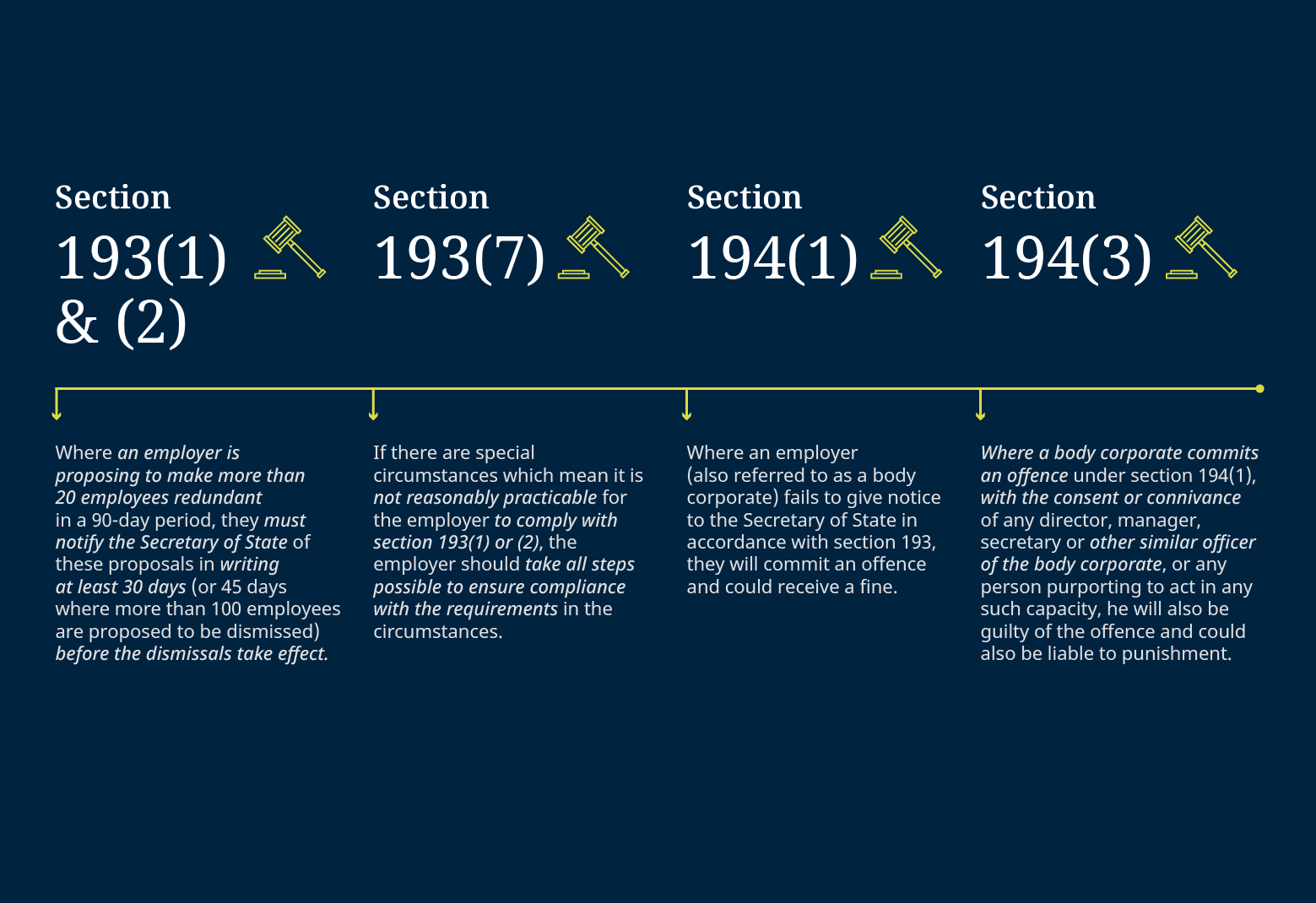
6 November 2023 • 6 minute read
Administrator - “officer of the company”? The risk of criminal liability under the Trade Union and Labour Relations (Consolidation) Act 1992
R (on the application of Palmer) v Northern Derbyshire Magistrates Court and another [2023] UKSC 38
Insolvency practitioners will welcome the Supreme Court’s recent decision that an administrator of a company appointed under the Insolvency Act 1986 (IA) does not fall within the ambit of section 194(3) of the Trade Union and Labour Relations (Consolidation) Act 1992) (TULRCA) and therefore cannot be held personally liable under criminal law for the company’s failure to give notice to the Secretary of State in accordance with section 193 of TULRCA.
Crucially, the Court determined that an administrator is not an officer of the company within the meaning of the phrase “any director, manager, secretary or similar officer of the body corporate”, for the purpose of section 194(3).
TULRCA
The issue in this case arises out of the obligations imposed by TULRCA on companies, and the people managing those companies, where there are proposals to make employees redundant. The salient provisions, applicable to the facts of this case, are identified below:

Counsel for the Appellant argued that if the above sections of TULRCA were to apply to administrators, it would leave them in a difficult position balancing their duties to the distressed company and its creditors on the one hand, against the time sensitive duties imposed by TULRCA under sections 193 and 194 on the other.
Counsel for the Respondents countered that if the sections did not apply to administrators this would remove any impetus to comply with these provisions of TULRCA making the criminal sanction redundant (if you’ll pardon the pun) and would also leave a lacuna in the chain of responsibility which would result in little protection for the interests of the company’s workers and the Secretary of State.
Facts
On 13 January 2015, Mr Palmer (the Appellant) was appointed as one of three joint administrators of West Coat Capital (USC) Ltd (WCC), a clothing, footwear and accessories retailer that was part of the Sports Direct group. The following day, certain employees of WCC’s Dundonald warehouse were handed a letter (signed by Mr Palmer) stating that they were at risk of redundancy and giving them notice of WCC’s intention to consult with them at a staff meeting later that day. Later that same day, the employees were handed a further letter (again signed by Mr Palmer) dismissing them by reason of redundancy with immediate effect. Despite dismissing employees on 14 January 2015, notification of the proposed dismissals (using form HR1 (which was signed by Mr Palmer)) was not submitted to the Secretary of State until 4 February 2015.
Criminal proceedings were issued against Mr Palmer in July 2015 where he was found liable by the Magistrate’s Court. He appealed the decision by judicial review in May 2018, but his appeal was disallowed when District Judge Davison ruled that an administrator fell within the meaning of an ‘officer’, for the purpose of section 194(3) of TULRCA.
Decision
On appeal, in a unanimous decision of the Supreme Court, the five Justices held that an administrator of a company appointed under the IA is not an officer of the company within the meaning of section 194(3) of TULRCA. Lord Richard gave the only judgment.
Meaning of ‘officer’ in the IA
First, as neither TULRCA nor any other enactment or clear authority defines the term ‘officer’ for the purpose of section 194(3) of TULRCA, the Supreme Court found it necessary to first refer to the IA, being the statue that created and governs the administration process, to understand the meaning of the term ‘officer’ in this context.
The Court found that none of the references to ‘officer’ in the IA suggested that an administrator is an officer of a company, and some references even distinguished an administrator from an officer of a company. Therefore, in creating the administration process, it was neither the intention nor the effect of the IA to classify an administrator as an officer of the company in administration.
Meaning of ‘officer’ in section 194(3) of TULRCA
Second, the Court held that the extension to ‘other similar officer of a body corporate’ in section 194(3) of TULRCA should not be read to include an administrator. The drafting restricted the definition of the term ‘officer’ to an individual ‘similar’ to a ‘director, manager or secretary’, militating against an expansive interpretation.
The Court held that a constitutional test applied, and the question was whether the person held an office within the constitutional structure of the body corporate, as is the case with directors, managers and secretaries. An administrator does not.
In reaching this conclusion, LJ Richards acknowledged the policy reasons cited by both parties in support of their position but ultimately concluded that neither justified a different approach in view of the wording of the legislation. LJ Richards noted that if the intention had been to adopt a functional test, Parliament could easily have done so simply by replacing the phrase “or other similar officer of the body corporate” with “or other person concerned in the management of the body corporate” as was the approach taken in other statutes.
Consequences & implications
Proposed administrators are often only introduced to a distressed company shortly prior to their appointment, and following their appointment, administrators have 14 days to determine whether the company’s employees should be retained or made redundant, before they are taken to have automatically adopted the existing contracts of employment of any employee retained. The wage and salary1 payable under the adopted contracts of employment are then payable in priority to the administrator’s fees and expenses, if unpaid when they leave office, and ahead of the distribution of assets to holders of floating charges and unsecured creditors (paragraph 99(5) of Schedule B1 to the IA).
Many administrators will be relieved not to be confronted with a dilemma of either:
- potentially delaying any redundancies to comply with the notification requirements under section 193 of TULRCA; or
- risking personal liability under criminal law by acting swiftly in the interests of achieving the statutory purpose of administration, which may require the immediate dismissal of all or some of the employees upon, or shortly after, their appointment, in order to achieve a better result for the company’s creditors as a whole.
Nevertheless, administrators should not treat this decision as a green light to flagrantly disregard the provisions of TULRCA; caution should still be exercised. This decision impacts on just one element of the obligations as regards to employees under TULRCA. There are additional obligations to consult with employee representatives in advance of any redundancies, with failure triggering a protective award of up to 90 days’ pay for each affected employee. Administrators should be mindful of these obligations when balancing the different interests involved, to avoid increasing the potential liabilities faced by the company in administration.
1Wage and salary include holiday pay, sick pay, payments in lieu of holiday and contributions to occupational pensions schemes.